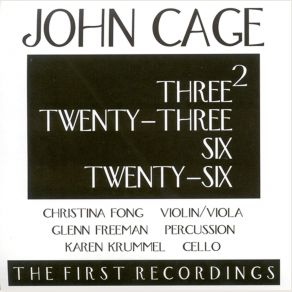Cage: Three2, Twenty-Three, Six & Twenty-Six
Download links and information about Cage: Three2, Twenty-Three, Six & Twenty-Six by Christina Fong, Glenn Freeman, Karen Krummel. This album was released in 1999 and it belongs to genres. It contains 4 tracks with total duration of 01:01:14 minutes.

|
|
|---|---|
| Artist: | Christina Fong, Glenn Freeman, Karen Krummel |
| Release date: | 1999 |
| Genre: | |
| Tracks: | 4 |
| Duration: | 01:01:14 |
| Buy it NOW at: | |
| Buy on iTunes $9.99 | |
Tracks
[Edit]| No. | Title | Length |
|---|---|---|
| 1. | Three2 | 9:05 |
| 2. | Twenty-Three | 23:03 |
| 3. | Six | 3:05 |
| 4. | Twenty-Six | 26:01 |
Details
[Edit]This recording collects four of John Cage's very late works, part of a series known as the "number pieces" written in the late '80s and early '90s. In these compositions, instrumentalists are presented with "time brackets" during which they either play or do not play, but the specific durations of activities, as well as modes of attack, are left up to them. Included here are two works for percussion ensemble and two for large string ensembles (both achieved through overdubbing). A feature in common to all of the pieces on the three discs is the utilization of extended tones. With the percussion works, this generally means lengthy washes of cymbals, cascades of small bells, and a prominent use of ringing, flex-a-tone kinds of sounds. "Three 2," performed by Glenn Freeman in three increasingly short portions, typifies this approach. For all its surface attractiveness, it's a difficult thing to get a good grasp on, the sequences of percussion passing by in seemingly random stages; one gets an impression of watching particularly mellifluous cars driving slowly by, different models or colors represented by different instruments. "Twenty-Three," for massed violins, violas, and celli (Christina Fong on the first two, Karen Krummel on the latter), is a gorgeous lattice of densely layered drones occupying a very small note range but varying widely in intensity of attack. Tony Conrad's violin music inevitably comes to mind, but there's nothing that remotely smacks of physics experiments here. More, there's a surprising (for Cage) amount of palpable, human striving and emotion. Sometimes, one imagines a luscious melding of Conrad and Gavin Bryars. It also contains something of a brief coda after the 21-minute mark, a slight but lovely mood shift away from the urgency expressed previously, more toward an uneasy acceptance. The short "Six" (which, unlike the other pieces whose durations in minutes are indicated by their titles — read "Three 2" as "three squared") lasts but three minutes and, not unlike the first track, consists of a series of bowed cymbals, jingle bell shakes, and timpani rolls, sliding segmentally across one's field of hearing. It's a rather strong work though, with an odd, alien kind of power, as though one is observing some baffling procession of unknown purpose. "Twenty-Six" is something of a counterpart to "Twenty-Three," save that all the parts are for violin and, perhaps simply due to Fong's persona, the emotional intensity is ratcheted up a notch or two. Again, one finds comparisons to music that one doesn't normally associate with Cage, in this case to some of Penderecki's writing for string orchestras from the '60s; there's something of a similar raw, naked vibrancy. It's a marvelous, searing performance, capping a very fine recording that should be far more widely heard than it's likely to be.